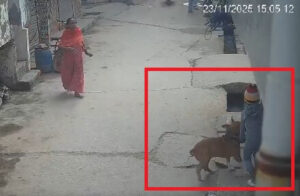Six dead as Dalit protests turn violent
New Delhi : Six persons were killed and dozens injured as Dalit protests during a day-long nation-wide shutdown on Monday turned violent in India amid anger against a Supreme Court order that dilutes a law aimed at preventing atrocities against Dalits and Tribes.
The government, in a bid to pacify the agitated activists, said it had filed a petition in the apex court seeking a review of its March 20 order that bars automatic arrest and registration of cases for alleged harassment of Dalits and others. But the top court denied an urgent hearing of the matter.
Protesters clashed with police in Gujarat, Madhya Pradesh, Rajasthan, Punjab, Uttar Pradesh, Uttarakhand, Jharkhand, Bihar and Odisha — states where normal life was paralysed in varying degrees amid incidences of violence and arson.
The central government rushed 800 anti-riot policemen to violence-hit Uttar Pradesh and Madhya Pradesh.
A Home Ministry official in Delhi said two companies of Rapid Action Force (RAF) were sent to Meerut and one company each to Agra and Hapur in Uttar Pradesh.
Clashes turned deadly in Madhya Pradesh where five persons were killed and dozens injured, forcing officials to impose curfew in Morena, Gwalior and Bhind districts. Protests were also held Bhopal as agitators blocked roads in the state capital.
Madhya Pradesh Chief Minister Shivraj Singh Chouhan made a passionate appeal for peace.
Police said one person each was killed in Bhind and Morena while three died in Gwalior. The dead in Morena was identified as Rahul Pathak, a student leader.
Gwalior District Magistrate Rahul Jain told IANS that at least 22 persons were injured, some critically, in clashes in his district, where prohibitory orders banning large gatherings were also imposed.
“Three people have been conformed dead in Gwalior.” Jain said.
A man identified as Pawan Kumar was killed in Rajasthan’s Alwar as violence was also reported from other parts of the state including Jaipur, Ajmer. Jaisalmer, Barmer, Jodhpur and Udaipur.
Punjab and Haryana also saw widespread protests.
Shops, educational institutions and other establishments remained closed and Class 10 and 12 examinations were deferred in Punjab, which has the highest concentration of Scheduled Castes, constituting nearly 32 per cent its 2.8 crore population.
Hundreds of protesters carrying swords, sticks, baseball bats and flags forced shopkeepers and other establishments in Jalandhar, Amritsar and Bathinda too shut down.
Protests also took place in Rohtak and other towns of neighbouring Haryana.
In Bihar, activists disrupted rail and road traffic. Mobs shut down markets and shops as well as educational institutions, police said.
Supporters of the Bhim Army and other Dalit outfits halted over three dozen long-distance and local trains, stranding thousands of passengers.
Violence was reported from Vaishali, Muzaffarpur, Nawada, Patna and Bhagalpur when protestors clashed with police.
Violence also erupted in parts of Uttar Pradesh as protesters attacked shops, looted some and pelted stones at police in Hapur, Agra, Meerut, Saharanpur and Prime Minister Narendra Modi’s Lok Sabha constituency Varanasi.
Many cars were targeted and their window panes smashed. At some places, government property was targeted.
Some people reportedly fired at a police team in Meerut while a passenger bus was set on fire.
Also in Meerut, over 500 Dalit youths targeted the media and broke their cameras as they were trying to photograph the protests.
Gujarat’s major towns and cities also saw protests by Dalits amid reports of vandalism from Ahmedabad and Jamnagar.
Amid widespread anger and violence, the Modi government filed a review petition in the Supreme Court to seek recall of its judgment that ruled that there would be no automatic arrest of an accused following a complaint moved under the Scheduled Castes and Scheduled Tribes (Prevention of Atrocities) Act, 1989.
The Supreme Court had held on March 20 that police will hold an inquiry to ascertain the veracity of the complaint filed under the act before acting on it.
Union Law Minister Ravi Shankar Prasad said the government “with due respect, does not agree with the reasoning given by the apex court”.
IANS





